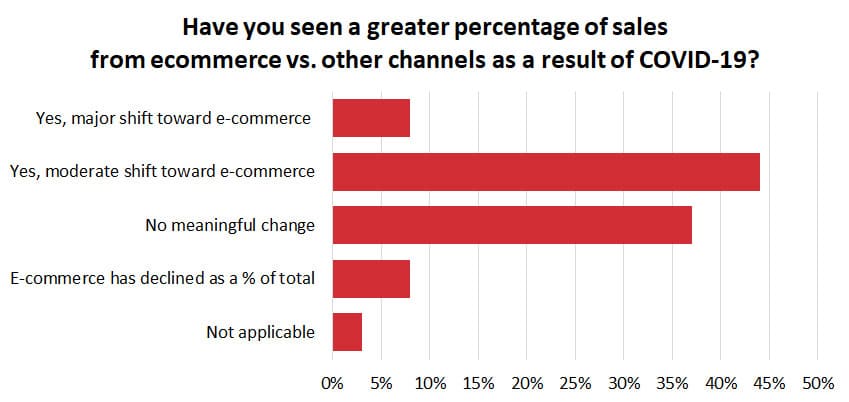In an April 2020 survey, Distribution Strategy Group found that the majority of respondents (52%) saw a moderate or major shift to online buying as a percentage of sales vs. other channels as a result of the COVID-19 pandemic and resulting lockdowns.
In other words, more end-users are embracing online shopping and buying for business out of necessity. Just as the B2C market has experienced a recent and rapid escalation in online buying – for example, online retail sales for CPG grew 56% for the week ending April 18, 2020 – the pandemic has accelerated the shift toward e-commerce for B2B buyers, and demonstrated its importance to distributors.

Unfortunately, the pandemic has also exposed the gap between those distributors that had already implemented e-commerce, and those that lagged in adoption.
In our April survey of distributors and manufacturers, more than 50% of respondents said that just 5% of their overall sales came from e-commerce in 2019. And our 2019 State of E-Business in Distribution survey showed that 87% of smaller companies and 55% of larger companies (greater than $1 billion) didn’t have e-commerce in place at all.
Those distributors with e-commerce in place at the start of this crisis have experienced sales growth and have likely taken market share. So if you’re still contemplating whether you should adopt e-commerce, the time for debate has passed.
How to Respond to the Digital Rush
In our survey, many distributors recognized the need to focus on digital going forward, including implementing or enhancing:
- Overall digital strategy
- Website
- E-commerce tools
- Remote working and selling tools
One respondent said: “We are placing a major focus on getting our distributors to break away from their comfort zones and break into e-commerce. We are leveraging the realities of the ‘social distancing’ phenomena the nation has been thrust into to point out the ‘electronic branches’ do not get shut down, and many end-users who have been forced to purchase online are going to continue to want to do so once social distancing eases.”
The respondents in this survey are on the right track. Several of their goals for the future are similar to those the industry has reported in years’ past, but the COVID-19 pandemic has greatly accelerated the need. It’s likely that the services and communication styles we’ve put in place to address the current pandemic will stick, to a certain degree.
A percentage of customers have developed a preference for services like online ordering, and businesses will continue to find cost benefits and efficiencies in video conferencing and curbside service. However, with the market as shaken up as it is, it may be difficult to identify the best investments and strategies to focus on moving forward.
Step one: Examine your digital and e-commerce strategies. As customers – and your competition – rush to digital, you don’t want to get left behind. If you don’t have a well-defined, updated digital strategy, develop one. Focus on the improvements you can make in the near-term and create a multi-phase plan for those long-term goals. And be sure to factor in a second wave of COVID-19-related restrictions.
Incorporate the following:
- Have an e-commerce platform, or upgrade your current platform if it doesn’t meet customer needs.
- Build out online chat and text services.
- Continue use of web conferencing for sales communications with clients.
- Train your sales teams on digital selling.
- Assess your website performance, conversion rate and user experience for potential improvements.
- Optimize your website for search to stay on customers’ radar, as search engine use has greatly increased during this crisis.
- Consider how your channels work together; build an omnichannel approach.
- Leverage targeted campaigns and activities to grow your e-commerce sales.
I created The Dean’s List, composed of the seven things you can do with digital to combat the impact of COVID-19 right now. These include strategies we’ve discussed, like web conferencing and online chat services, and tips for following through on them. As I mentioned, the time for debating whether an e-commerce platform is necessary has passed. If you don’t, you’ll watch the market move past your capacity to serve.
If you’d like to assess your current ecommerce capabilities and needs, reach out to us today.
Dean Mueller is Independent Consultant at Distribution Strategy Group. He has more than 30 years of experience in sales and marketing and helps distributors build holistic digital strategies that drive a significant shift to online sales, improve profitability and grow customer satisfaction. Take your digital strategy to the next level. Contact Dean at dmueller@distributionstrategy.com.
